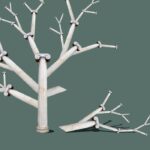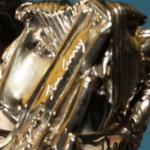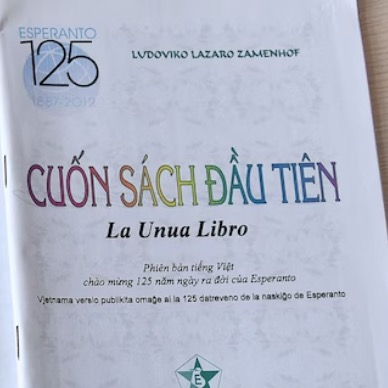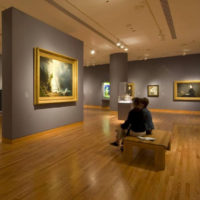AJ Four Ways: Text Only (by date) | headlines only
DANCE
IDEAS
- 60 Years After Hollywood Abandoned It, VistaVision Is Back

While the format was quite popular in the 1950s (Vertigo and The Ten Commandments were filmed in it), the industry moved on in the 1960s and few VistaVision cameras have survived. Yet the films made in it in just the past few years include The Brutalist, Bugonia, Wuthering Heights, and One Battle After Another. – AP
- Dalí Museum In Florida Announces $65 Million Expansion

The 35,000-square-foot addition to the St. Petersburg institution, expected to begin construction this year and open in 2028, will increase exhibition space, add a dedicated learning center, and provide flexible environments for “experiential exhibitions that blend art and technology.” – Tampa Bay Times
- Is This Bust Of Jesus A Michelangelo? Independent Researcher Says Yes, Scholars Are Skeptical

Valentina Salerno, an actress and novelist with no formal training in art history, says she has reviewed numerous documents indicating that the sculpture, located in a Roman church, is the work of Michelangelo. She published her findings at a non-peer-reviewed website, though she says she’s willing to let scholars examine her research. – AP
- Trump’s “Freedom Truck” Mobile Exhibitions Are Now On The Road

“As the U.S. gears up for the 250th anniversary of the signing of the Declaration of Independence, President Donald Trump has dispatched six roving Freedom Truck exhibitions to crisscross the country. The first of 20 planned stops — mainly in the South, with forays to the Midwest, Arizona, and Utah — was last month in Nashville.” – Artnet
- Belarus Free Theatre To Appear At Venice Biennale

“The Belarus Free Theatre, an underground theater group in exile since 2020, announced Wednesday that it will stage the exhibition ‘Official. Unofficial. Belarus.’ as an official collateral event of the 61st Venice Biennale.” – ARTnews
ISSUES
- Dalí Museum In Florida Announces $65 Million Expansion

The 35,000-square-foot addition to the St. Petersburg institution, expected to begin construction this year and open in 2028, will increase exhibition space, add a dedicated learning center, and provide flexible environments for “experiential exhibitions that blend art and technology.” – Tampa Bay Times
- Is This Bust Of Jesus A Michelangelo? Independent Researcher Says Yes, Scholars Are Skeptical

Valentina Salerno, an actress and novelist with no formal training in art history, says she has reviewed numerous documents indicating that the sculpture, located in a Roman church, is the work of Michelangelo. She published her findings at a non-peer-reviewed website, though she says she’s willing to let scholars examine her research. – AP
- Meet The Last Of The Signpainters For The Markets Of Naples

“Announcing the clementines, artichokes and other goods on offer are cheerful, hand-painted signs in sun-bright lettering. Quotidian but also quintessential, the signs have become emblems of Naples’s vibrancy. … Pasquale De Stefano is, by consensus, the last living numeraio — or number painter — in Naples.” – The New York Times
- Buckminster Fuller Sculpture Collapses Following Snowstorm

The piece, installed outdoors at the LongHouse Reserve on the South Fork of eastern Long Island, is one of only five existing versions of Fuller’s Fly’s Eye Dome. The roof of the fiberglass structure caved in under the weight of the heavy snow which fell in late February. – Artnet
- Site Of Cancelled Pompidou Center Jersey City May Become Affordable Housing

“Jersey City Mayor James Solomon, who took office in January” and killed the project shortly afterward, “announced Monday that the city would work with Kushner Real Estate Group on new plans for the Artwalk Towers development.” – Gothamist
MEDIA
- Trump’s “Freedom Truck” Mobile Exhibitions Are Now On The Road
“As the U.S. gears up for the 250th anniversary of the signing of the Declaration of Independence, President Donald Trump has dispatched six roving Freedom Truck exhibitions to crisscross the country. The first of 20 planned stops — mainly in the South, with forays to the Midwest, Arizona, and Utah — was last month in Nashville.” – Artnet
- LA’s Art Gold Rush Ends, Actual Work Begins
The carpetbaggers have packed their Hermès bags and fled back east. What remains? The unglamorous business of building a real art scene—one gallery lease and artist studio at a time. — Artnet
- Supreme Court to AI Art: Sorry, Humans Only
The high court declined to revisit whether algorithms can hold copyright, leaving AI creations in legal limbo. While tech bros rage and traditional artists breathe easier, the real question remains: who profits when creativity gets automated? — Artnet
- The Role Of Arts And Culture In Turbulent Times
When the news and social media are flooded with opposing interpretations of events, outright lies, and about a zillion editorial style video shorts that offer about a zillion different opinions, art and culture can bring the reality and humanity of the headlines to light. – Ludwig Van
- Downtown L.A.’s Latest, And Smallest, Performance Venue Looks Like An Electrical Box
Indeed, when artist S.C. Mero was installing it in the Arts District, police stopped her, concerned she was ripping out copper wire. Inside, the Electrical Box Theatre is “an impromptu performance space for the sort of experimental artists who no longer have an outlet in downtown’s galleries or more refined stages.” – Los Angeles Times (Yahoo!)
MUSIC
- Who Wrote This? The Age-Old Question Gets Circuitry
Before ChatGPT made everyone panic about robot poets, writers were already grappling with authenticity’s slippery slope. Ghostwriters, collaborators, editors—the literary world’s dirty secret is that pure authorship was always a romantic fiction. — LitHub
- The Artist Who Copied Out The Complete “Moby-Dick” By Hand
Bethany Collins spent four months transcribing the 900-odd-page text. She finds many of Melville’s concerns relevant today: “following the lone madman who will take the whole ship down, … overconsumption, the pursuit of oil and an obsession with whiteness.” (Okay, the last one might be a stretch.) – T — The New York Times Magazine
- The AI-Written College Essay And The Decline Of Thinking
Surely the most dismal prospect is that we will lose sight of our own forms of thinking and understanding if those terms are assimilated to the capacities of AI. – Public Books
- Poet Threatens To Sue Arts Council England After Defunding
A poet is threatening Arts Council England (ACE) with legal action after a magazine it funds withdrew her work from publication based on her “social media presence”, which she believes refers to gender-critical posts. – The Guardian
- Firefighters Rescue Rare Books From A Library On The Cliff Edge After Landslide
“Firefighters drilled through the wall of a building behind the structure and entering for minutes at a time, strapped the bookcases together and hauled them backwards to reach the books.” – The Guardian (UK)
PEOPLE
- 60 Years After Hollywood Abandoned It, VistaVision Is Back
While the format was quite popular in the 1950s (Vertigo and The Ten Commandments were filmed in it), the industry moved on in the 1960s and few VistaVision cameras have survived. Yet the films made in it in just the past few years include The Brutalist, Bugonia, Wuthering Heights, and One Battle After Another. – AP
- Dalí Museum In Florida Announces $65 Million Expansion
The 35,000-square-foot addition to the St. Petersburg institution, expected to begin construction this year and open in 2028, will increase exhibition space, add a dedicated learning center, and provide flexible environments for “experiential exhibitions that blend art and technology.” – Tampa Bay Times
- Is This Bust Of Jesus A Michelangelo? Independent Researcher Says Yes, Scholars Are Skeptical
Valentina Salerno, an actress and novelist with no formal training in art history, says she has reviewed numerous documents indicating that the sculpture, located in a Roman church, is the work of Michelangelo. She published her findings at a non-peer-reviewed website, though she says she’s willing to let scholars examine her research. – AP
- Trump’s “Freedom Truck” Mobile Exhibitions Are Now On The Road
“As the U.S. gears up for the 250th anniversary of the signing of the Declaration of Independence, President Donald Trump has dispatched six roving Freedom Truck exhibitions to crisscross the country. The first of 20 planned stops — mainly in the South, with forays to the Midwest, Arizona, and Utah — was last month in Nashville.” – Artnet
- Belarus Free Theatre To Appear At Venice Biennale
“The Belarus Free Theatre, an underground theater group in exile since 2020, announced Wednesday that it will stage the exhibition ‘Official. Unofficial. Belarus.’ as an official collateral event of the 61st Venice Biennale.” – ARTnews
PEOPLE
- 60 Years After Hollywood Abandoned It, VistaVision Is Back
While the format was quite popular in the 1950s (Vertigo and The Ten Commandments were filmed in it), the industry moved on in the 1960s and few VistaVision cameras have survived. Yet the films made in it in just the past few years include The Brutalist, Bugonia, Wuthering Heights, and One Battle After Another. – AP
- Dalí Museum In Florida Announces $65 Million Expansion
The 35,000-square-foot addition to the St. Petersburg institution, expected to begin construction this year and open in 2028, will increase exhibition space, add a dedicated learning center, and provide flexible environments for “experiential exhibitions that blend art and technology.” – Tampa Bay Times
- Is This Bust Of Jesus A Michelangelo? Independent Researcher Says Yes, Scholars Are Skeptical
Valentina Salerno, an actress and novelist with no formal training in art history, says she has reviewed numerous documents indicating that the sculpture, located in a Roman church, is the work of Michelangelo. She published her findings at a non-peer-reviewed website, though she says she’s willing to let scholars examine her research. – AP
- Trump’s “Freedom Truck” Mobile Exhibitions Are Now On The Road
“As the U.S. gears up for the 250th anniversary of the signing of the Declaration of Independence, President Donald Trump has dispatched six roving Freedom Truck exhibitions to crisscross the country. The first of 20 planned stops — mainly in the South, with forays to the Midwest, Arizona, and Utah — was last month in Nashville.” – Artnet
- Belarus Free Theatre To Appear At Venice Biennale
“The Belarus Free Theatre, an underground theater group in exile since 2020, announced Wednesday that it will stage the exhibition ‘Official. Unofficial. Belarus.’ as an official collateral event of the 61st Venice Biennale.” – ARTnews
THEATRE
VISUAL
- Universities As Practical Job Creators? We Ought To Do Better Than That!
An education spent in pursuit of material comfort and convenience is a recipe for unhappiness, an existence in thrall to the raw, hungry American mantra of success, “More! More!” – LA Review of Books
- When Pop Culture Has a Half-Life of Six Months
Kids giggling at “six-seven” reveals the brutal math of digital culture: references expire faster than milk. What happens when shared cultural touchstones become as fleeting as TikTok trends? Generational gaps now measure in weeks, not decades. — Common Reader
- Why Is It So Hard To Make The Case For Universities?
The “constitutive” role of universities cannot merely be announced to like-minded audiences or extracted from sympathetic courts. – Chronicle of Higher Education
- There Are No Psychopaths?
While it has been researched across hundreds of empirical studies – especially since the explosion of research in the late-1990s – there is still remarkably little evidence that corroborates popularised claims about the diagnosis. – Aeon
- A Conspiracy Theory That A Jim Carrey Doppelganger Picked Up His Honorary Cesar Is Making The Rounds In France
This is where we are with the internet now: The man in charge of the Césars (the “French Oscars”) had to say, ““From the outset, he was extremely touched by the Academy’s invitation. … He worked on his speech in French for months.”- The Guardian (UK)


















